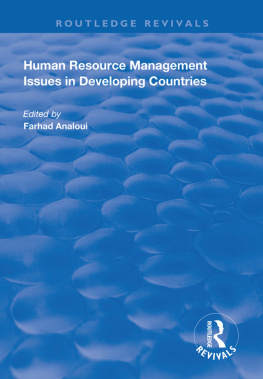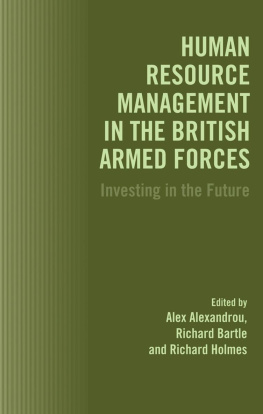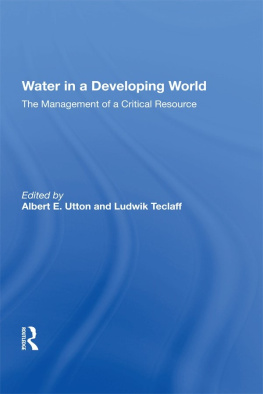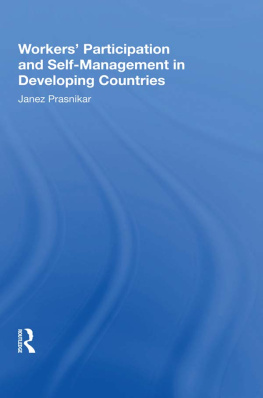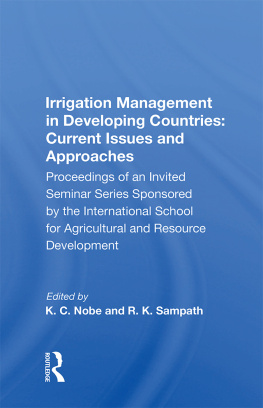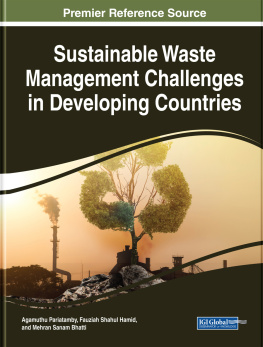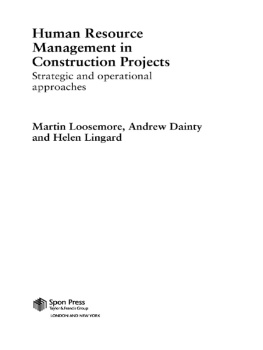HUMAN RESOURCE MANAGEMENT ISSUES IN DEVELOPING COUNTRIES
Human Resource Management Issues in Developing Countries
Edited by
Farhad Analoui
Development and Project Planning Centre University of Bradford
First published 1998 by Ashgate Publishing
Reissued 2018 by Routledge
2 Park Square, Milton Park, Abingdon, Oxon, OX14 4RN
711 Third Avenue, New York, NY 10017, USA
Routledge is an imprint of the Taylor & Francis Group, an informa business
Copyright Farhad Analoui 1998
All rights reserved. No part of this book may be reprinted or reproduced or utilised in any form or by any electronic, mechanical, or other means, now known or hereafter invented, including photocopying and recording, or in any information storage or retrieval system, without permission in writing from the publishers.
Notice:
Product or corporate names may be trademarks or registered trademarks, and are used only for identification and explanation without intent to infringe.
Publisher's Note
The publisher has gone to great lengths to ensure the quality of this reprint but points out that some imperfections in the original copies may be apparent.
Disclaimer
The publisher has made every effort to trace copyright holders and welcomes correspondence from those they have been unable to contact.
A Library of Congress record exists under LC control number: 98072802
ISBN 13: 978-1-138-32027-7 (hbk)
ISBN 13: 978-0-429-45341-0 (ebk)
Contents
Farhad Analoui
Oriel Kenny
Pauline M. Amos-Wilson
Harry Wes
Pete Mann
Derek Eldridge and Ernita Joaquin
John Launder
John Cusworth
S. Tene Kaminski
A. R. Analouei
Farhad Noorbakhsh
Hossein Jalilian and Y. Yashar Sentrk
Guide
Chapter 1
Chapter 3
Chapter 5
Chapter 6
Chapter 7
Chapter 10
Chapter 11
Chapter 12
Pauline M. Amos-Wilson Principle Lecturer, Oxford Brooks University. She is currently the Manager for the MBA Programme.
Dr. A. R. Analouei is currently with InfoPro as a Group Manager and has previously held key managerial positions including, Associate Professor of Research, Georgetown University, U.S.A.
Dr. Farhad Analoui Senior Lecturer, Director of Professional Development and Training Programmes, Development Project Planning Centre, University of Bradford, UK.
John Cusworth Senior Lecturer, Head of the Department, Development and Project Planning Centre, University of Bradford.
Derek Eldridge Lecturer, Institute for Development and Policy Management, University of Manchester.
Dr. Hossein Jalilian Lecturer, Development and Project Planning Centre, University of Bradford, UK.
Ernita Joaquin Researcher in the Local Government Centre, College of Public Administration, University of the Philippines.
S . Tene Kaminski Lecturer, Bolton Business School, Bolton, UK.
Oriel Kenny Lecturer, Development and Project Planning Centre, University of Bradford, UK.
John Launder Lecturer, Development and Project Planning Centre, University of Bradford.
Dr . Pete Mann Lecturer, Institute for Development and Policy Management, University of Manchester.
Dr. Farhad Noorbakhsh Senior Lecturer, Centre for Development Studies, University of Glasgow, UK.
Y. Yashar Sentrk Doctoral Research Student, Development and Project Planning Centre, University of Bradford. Research Officer, University of Aberdeen, UK.
Harry Wes Research Associate, Graduate Business School, University of Strathclyde. He is a Fellow of the Institute of Personnel and Development.
People are no longer viewed as mere input to closed system organisations, occupying well defined isolated roles, and working and living in a relatively stable environment. The mechanistic notions of managing people in a controlled context have rapidly become a thing of the past. Today in a changing environment in which socio-economic factors are but only one major changing factor, the accepted reality is also that of changing expectations of people from organisations, in addition to the presence of fierce competition in an unstable market economy towards meeting the demands of an uncertain future. In such precarious circumstances human resources constitute the most important factor, should the organisation be interested in their long term, continued survival and development.
The complexity of organisational interface with one another, and the explosion of information technology, in addition to changing expectations in the workplace, makes Personnel Management (PM) with its limited role, an increasingly redundant concept. The midddle ground position of PM between the management and the employees not only implies that they assume a devisive role which draws a distinction between management and the employee, it also places disproportionate emphasis on exercising external control and meeting the short term needs of their organisation and its resources. Human Resource Management (HRM), on the other hand, sees the organisation from a holistic perspective, an integrated system within an interrelated network of local, national and international organisations.
One of the major aspects of HRM, not surprisingly, is the Development of Human Resources with the strategic view of meeting future needs and demands of the organisation. Thus, assuming a far greater role than paying attention not only to maintaining the status quo by employing and training employees and being responsible for their welfare, rather than being engaged in the proactive process of forecasting, planning and developing strategies to develop the human resources needed to meet the future demands. The issues of quality therefore are no longer discussed only in relation to the product and services of an enterprise, but in the context of learning organisations with change cultures and work life relationships.
The vast field of HRM and its related issues however, has posed a challenge for the academics and scholars who assume the role of providers of know-how for the practitioners in the development field. At the Development and Project Planning Centre (DPPC), University of Bradford, this need and necessity has long been realised. The formation of a research cluster in Human Resource Management and Development in 1993 was a response to this need. The international seminar held in March 1996 and subsequent International Conference which was held at the Centre in 1997 allowed greater participation and involvement of both scholars and practitioners to explore HRM issues and share their understandings and experiences of human development.
Farhad Analoui
Senior Lecturer
I wish to acknowledge the contribution made by so many individuals who have been either directly or indirectly involved in the preparation of the present volume. In particular, I would like to thank Pauline Fell who organised the conference which provided the basis for the present collection of papers. Also, thanks are due to Jean Hill for the production of many drafts of the manuscript, Sue Mackrill for assisting with the print of the final camera - ready copy of the work and finally, my wife Janet Analoui for the reading through the text and her constructive and detailed comments and suggestions.


